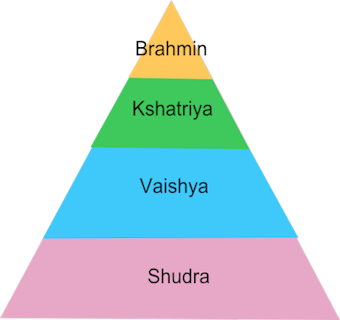
The concept of Varna is based on the qualities of self and they are subject to transformation by individual effort. To ask someone to what varna he belongs is something like enquiring whether he is a good or wicked man. Therefore it becomes clear that the qualitative division of varna in the Vedas is not supposed to be on the basis of birth. It is only by the practice of yoga, one becomes a yogi. If one thinks that castes can be determined on the basis of origin from the different parts of Brahman that also would not be logical, for the son of a Yogi does not necessarily become a yogi by birth. Purusha Sukta of the Rig Veda similarly mentions the birth of four varnas from the different parts of Brahman (God) brahmana was born from His (Brahman’s) face, kshatriya from the shoulders, from the thigh vaisya and from the feet sudra. Then why weren’t the four varnas created with appropriate physical distinctions? If it were so, all would have observed the caste rules from birth itself.

Even among men and in the same varna every individual is distinctly different from each other. God has created all beings including man with distinct physical features. If the origin of the four varnas were from the above sources, the corresponding physical differences should also have been created for the different varnas.

The Bhavishya Purana states that from Soma the brahmanas were born, from the Sun kshatriyas, from the Ocean vaisyas and from Daksha the sudras (Somaadvaii braahmanaah jaataah, suuryaad raajanya vamshajah, Samudraat sakalaah vaishyaah, dakshaat sudraah babhuuvire). It may also mean the offering (dakshina) to Guru by the disciples Upastavam means living with Guru Damam is physical and mental self control through a life of penance Sraddha – the desire for knowledge Samprasna –clarification of doubts from Guru Anaakiikaranam – not imparting the acquired knowledge to unqualified people Yoga means living in constant thought of the acquired knowledge. Here vitthi means pragna (self consciousness). The above verse enumerates the eight qualities that disciples require for initiation into Vedas. Vedasya ashtau upanishado bhavanthi Vithishcha- Upastavashcha, Damascha, Sraddha cha, Samprasnascha, Anaakiikaranam cha, Yogascha,Aachaarya Sushruusha iti. Whatever Varna one belongs to, the basis for becoming a brahmana is internal qualities like self-enquiry through a life of penance. Nitya naimittikaadiini karmaani Kurvanthiiti Braahmana, or Sayana in his treatise on Vedas has defined the word brahmana as one who lives by the knowledge of Brahman and Vedas or who has realized Brahman: Indra, the head of devas (gods), is said to have desired brahma varchasam (brahmanhood) through the performance of a yaga. Tapasaa kshatram utrujyo lalabhe brahma varchasam. It is said about a person in Srimad Bhagavata Purana that he obtained brahma-varchasam (brahmanhood) discarding kshatriyahood. The desire for brahmanhood is denoted by brahma varchasa kamana. From this mantra as well as from some others, it becomes clear that Sudras also had the right to initiation as against the institutes of Manu and other dharma shastras, which are obviously interpolated versions. The Sudras were initiated by water in yagna ceremony. The Sudra is also eligible for initiation which becomes clear from the mantra in Aitareya Brahmana – ‘Yadyapah Sudranam Sah Daksha’. It is with such penance (tapas) the kshatriya and vaisya become eligible for initiation (deeksha). Great sages like Vishwamitra attained the title of Brahma Rishi (Brahmanhood) by performing long years of penance. Brahmana means the possessor of transcendental knowledge or one who has realized Brahman (the Supreme Light). Through such spiritual realization they become brahmanas. After observing austerities, the Kshatriyas and Vaisyas obtain spiritual elevation and thus become qualified to be initiated into the path of spiritual realization. The Varna system was not based on hereditary or external features but on innate soul qualities.

Caste was the invention of a group of greedy vaidikas to subjugate the subaltern population of India.

Caste is different from the Varna concept. They remained impassive even when the country was plundered by outsiders. The majority of people were suffering under the millstone of caste system. With the introduction of caste system, the Indian society had lost its unity which greatly helped outsiders to conquer and plunder India, both culturally and politically.


 0 kommentar(er)
0 kommentar(er)
